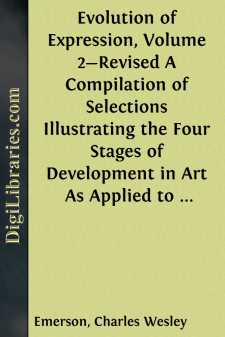Categories
- Antiques & Collectibles 13
- Architecture 36
- Art 48
- Bibles 22
- Biography & Autobiography 813
- Body, Mind & Spirit 142
- Business & Economics 28
- Children's Books 17
- Children's Fiction 14
- Computers 4
- Cooking 94
- Crafts & Hobbies 4
- Drama 346
- Education 46
- Family & Relationships 57
- Fiction 11829
- Games 19
- Gardening 17
- Health & Fitness 34
- History 1377
- House & Home 1
- Humor 147
- Juvenile Fiction 1873
- Juvenile Nonfiction 202
- Language Arts & Disciplines 88
- Law 16
- Literary Collections 686
- Literary Criticism 179
- Mathematics 13
- Medical 41
- Music 40
- Nature 179
- Non-Classifiable 1768
- Performing Arts 7
- Periodicals 1453
- Philosophy 64
- Photography 2
- Poetry 896
- Political Science 203
- Psychology 42
- Reference 154
- Religion 513
- Science 126
- Self-Help 84
- Social Science 81
- Sports & Recreation 34
- Study Aids 3
- Technology & Engineering 59
- Transportation 23
- Travel 463
- True Crime 29
Evolution of Expression - Volume 1
Categories:
Description:
Excerpt
INTRODUCTION.
Teach me, then,
To fashion worlds in little, making form,
As God does, one with spirit,—be the priest
Who makes God into bread to feed the world.
—Richard Hovey.
The revised edition of the "Evolution of Expression" is issued in response to frequent requests from teachers and students for a formulation of those principles upon which natural methods in the teaching of expression are based. It is hoped that the brief explanatory text introducing each chapter may aid teacher and pupil to avoid arbitrary standards and haphazard efforts, substituting in their place, psychological law. Growth in expression is not a matter of chance; the teacher who understands nature's laws and rests upon them, setting no limit to the potentialities of his pupil, waits not in vain for results.
No printed text, however, can take the place of a discerning teacher. A knowledge of the philosophy of education in expression avails little without the ability to create the genial atmosphere conducive to the development of the student. The teacher is the gardener, his service—his full service—is to surround the young plant with favorable conditions of light and soil and atmosphere; then stand out of its way while it unfolds its full blossom and final fruitage.
The tendency of modern education is towards the discovery and perfection of methods. The thought of leading educators is turned from the what to the how; to the development of systems of progressive steps through which the pupil may be led to a realization of himself. This trend is best shown in the multiplicity and excellence of recent pedagogical treatises and in the appearance of carefully graded and progressive text-books. The ancients believed that their heroes were born of gods and goddesses. They knew of no means by which the mind could be developed to the compass of greatness. The ancient theory to account for greatness was preternatural birth; the modern theory is evolution. To-day the interest of the child is awakened, his mind is aroused, and then led onward in regular steps.
The study of all forms of art, so far as methods are concerned, should be progressive. For correct guidance in our search for the best methods, we must understand the order of the development of the human mind. A child, before he arrives at an age where he can be taught definitely, is simply a little palpitating mass of animation. Soon he begins to show an attraction toward surrounding objects. Next he begins to show a greater attraction for some things than for others. His hands clutch at and retain certain objects. He now enters the period of development where he makes selections, and thus is born the power of choice. Objects which, at first, appeared to him as a mass now begin to stand out clearly one from another; to become more and more differentiated, while the child begins to separate and to compare. Thus the brain of the child passes through the successive stages from simple animation to attraction, to selection or choice, to separation or analysis....



